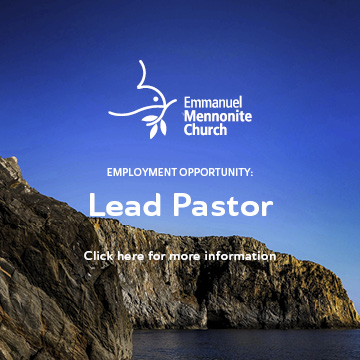Mennonite Central Committee (MCC) B.C. made headlines across Canada when it announced last September that it had received a gift of property worth $229.6 million.
Henry Rempel of New Westminster, B.C., who died June 9, 2023, and his wife, Mary Rempel, who predeceased her husband in 2014, wanted to help “the poorest of the poor” with the gift.
The portfolio of rental and development properties that the Rempels gave MCC B.C. is held in subsidiary companies owned by the relief organization, and collectively referred to as HyLand Properties (formerly MCC Legacy Trust).
HyLand’s purpose is to operate the portfolio of properties on an ongoing basis, with the goal of maintaining the value while also making annual donations to support MCC’s work.
The Rempels made their first donation of property to MCC, an apartment in Prince George, B.C., in 2012. The $229.6 million property donation was another step in a relationship they built with MCC over more than 10 years.
According to Wayne Bremner, executive director of MCC B.C., the relief organization has a gift acceptance policy stipulating that any potential donation greater than $25,000 needs to be reviewed by a committee made up of MCC leadership staff.
The committee considers whether the giver has agency, if the gift fits within MCC’s mission and whether there are any strings attached to the gift.
“MCC is very earnest about working from a principled point of view when receiving large donations of any kind,” Bremner says, “and we have to report on that annually to the board.”
MCC B.C. wholly owns Hyland and is the sole shareholder of the HyLand group of companies. It appoints the directors of the HyLand board and related subsidiaries as needed.
The board of MCC has five questions it asks when determining which projects HyLand takes on: How does it reflect on MCC and its values? Does it fit within the core business expertise of HyLand? Does it have a good return on investment that can eventually generate donations? What kind of financial risk is involved? What could go wrong that would reflect poorly on MCC and HyLand?
MCC B.C. is now a rich landowner in a province with a housing crisis. Bremner says the organization is mindful of how it can work to address the housing crisis while honouring Henry Rempel’s desire to “help the poorest of the poor in the developing world” with the money that HyLand generates.
HyLand has partnered with the Pacific Centre for Discipleship Association, a Christian community for university and college students, to build Menno Hall—a four- to six-storey development near the University of British Columbia in Vancouver that will include 101 student housing units, academic space, common areas, a large meeting facility, a concert hall and outdoor courtyards.
Menno Hall will also include 86 rental residences that Bremner says meet the threshold of affordable housing.
According to its website, HyLand “is targeting a contribution [to MCC] of $20 million over the next five years, with aspirations for this figure to exponentially increase over time.”
Bremner says that MCC remains an organization that depends on its constituency to have an impact around the world. “We are still the same grassroots organization where every donation helps,” he says. “[The Rempels’ donation] is just another source of revenue that helps us achieve our purpose.”
Shantz Mennonite Church
Mike Shantz was worried when he learned that his church was receiving a bequest worth millions of dollars.
“Money can create problems that didn’t exist when you didn’t have that money,” he says. “How people think about it and what they want to do with it can vary greatly.”
More than 10 years ago, Shantz Mennonite Church was given a bequest by the estate of Enid and Harold Schmidt, longtime members of the congregation.
The estate’s legal representation and executor have been liquidating the Schmidts’ assets, which included a dairy farm, a telecommunications company and several other properties, since then. The majority of the proceeds have been divided between Mennonite Church Eastern Canada and Shantz Mennonite. Shantz Mennonite has received several million dollars so far, says Mike, vice chair of the church’s council.
“Our church was very fortunate,” he says. “Prior to receiving the bequest, a few policies were put into place, laying out the groundwork for how bequests should be handled when received by our church.”
The church appointed a four-person bequest investment team to work with Abundance Canada and other investment platforms to invest the money in a diversified portfolio. The four-person team monitors the investments on an ongoing basis.
The church was led to give “a first fruits offering,” giving 10 per cent of the principal away. The first offering went to support refugees in crisis.
Every time another property is sold, the church gives 10 per cent of what it receives to other charitable organizations.
The church also used some of the money to build a new facility, as it had outgrown its previous building. To adhere to the bequest policy, the congregation used no more than 50 per cent of the bequest principal for the new facility.
Additionally, the church formed a four-person bequest earnings disbursement team. The team receives applications from local, national and international charities.
Twice a year, the bequest earnings disbursement team brings the applications to the congregation, who decide how the earnings should be dispersed.
Shantz Mennonite has received applications from a variety of organizations, including other churches, a local hockey organization trying to make sports accessible to low-income families, and a nearby college that used the money for clean water projects in Indigenous communities.
“We want to be a good steward,” Mike says. “These funds have not been generated by our efforts—they have been given to us.”
The church votes on which applications should be accepted.
In a reflection published in Canadian Mennonite in June 2022, Don Penner, then the pastor at Shantz Mennonite, wrote that the congregation’s participation in the decision-making about the money “has been huge and holy.”
“It has required great amounts of time and energy to learn to discern the way,” Penner wrote. “In the process, new talents and wisdom emerged, thanks to the Spirit providing the right people for the needs of the moment.”
Mike said that working with the Schmidts’ gift has “been an honour as well as a lot of work, but it has also been inspirational.”
He adds that the church’s bequest fund has relied on donations from many people, not just the Schmidts.
“We’ve made an effort to recognize that these things are made possible by the proceeds of others as well,” Mikesays.








Comments
When huge amounts of money are collected in a single pocket and our youth are abandoned with no job opportunities, the Church has a problem. Perhaps we can learn something from our Hutterite Brothers?
... perhaps a moment to reflect on an MCC leader who walked alongside the donors and won their respect. Without the guidance and integrity of Wayne Bremner, this gift may have never happened. Well done good and faithful servant.
Add new comment
Canadian Mennonite invites comments and encourages constructive discussion about our content. Actual full names (first and last) are required. Comments are moderated and may be edited. They will not appear online until approved and will be posted during business hours. Some comments may be reproduced in print.